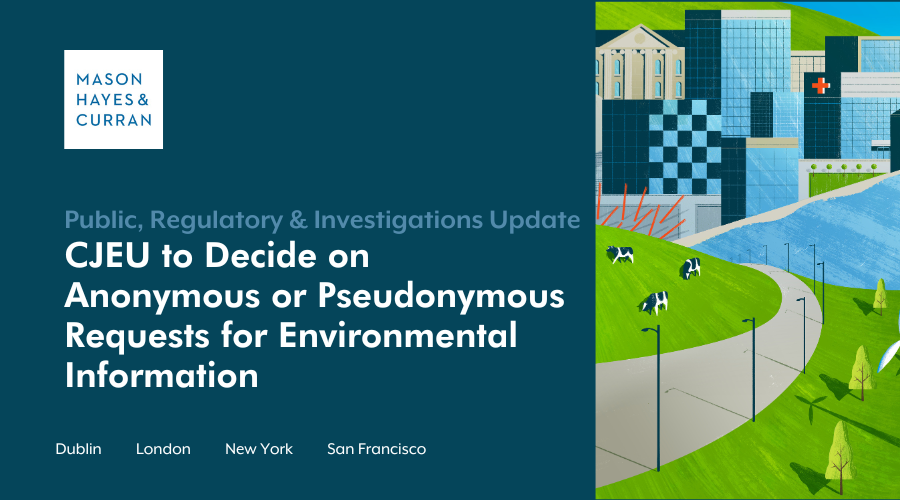CJEU to Decide on Anonymous or Pseudonymous Requests for Environmental Information

The High Court has asked the CJEU for a preliminary ruling on certain questions relating to AIE law. These include whether a person requesting environmental information can do so anonymously or pseudonymously. Niall Michel, Public, Regulatory & Investigations partner, considers the judgment and its potential implications for the AIE regime.
The High Court has referred five questions of interpretation concerning Directive 2003/4/EC (the AIE Directive) to the Court of Justice of the European Union (the CJEU).
The questions arise out of an appeal brought by Coillte against a decision of the Commissioner for Environmental Information (the Commissioner). The Commissioner had found that Coillte was not justified in treating requests made anonymously or pseudonymously as invalid under article 6(1)(c) of the European Communities (Access to Information on the Environment) Regulations 2007 to 2014) (the AIE Regulations).
Facts
Over a period of three months in 2022, Coillte received over 100 requests for environmental information, equating to just over two requests per working day in that period. The requesters generally did not provide a physical address, and the names included with the requests seemed to correlate with those of film characters or actors in American cinema from the 1980s onwards. Coillte became aware of the issue due to the similarity in style, type and phraseology of the requests. It noted that the names given by the requesters were suggestive of their possibly not being the requester’s actual names.
The Department of Agriculture, Food and the Marine had also received a significant volume of requests in 2022. Many of these were made in the names of film or fictional characters, such as “Willy Wonka”.
Coillte, which had to increase resources to reply to all the requests received, asked the applicants to confirm their legal names and current addresses. When no responses were provided, Coillte treated the requests as incomplete and invalid under Article 6(1)(c) of the AIE Regulations. As a result, none of the applicants received the information sought within the statutory one-month timeframe.
Article 6(1)(c) of the AIE Regulations provides that an AIE request “shall state the name, address and any other relevant contact details” of the applicant.
The requesters sought an internal review, and Coillte once again requested confirmation of name and address. As this was not provided, Coillte again treated the requests as invalid. The applicants then appealed to the Commissioner, who decided that Coillte was not justified in treating the requests as invalid. He found that the Directive did not require an applicant to identify themselves but merely required them to provide sufficient contact information, such as an email address. Coillte appealed this decision to the High Court.
High Court decision
The High Court has stayed the proceedings and referred five questions on the interpretation of EU law to the CJEU. In doing so, the Court noted that, in the absence of clarification, it would determine as a matter of Irish law that:
- “Name” under Article 6(1)(c) meant actual name and not a pseudonym;
- “Address” meant a current physical address at which the requester might be contacted; and
- “Email details” would only arise under “any other relevant contact details” in Article 6(1)(c).
The High Court also found as a fact that Coillte had formed the reasonable view in the circumstances that the genuineness of the applicants’ identity-information was questionable. It further found that Coillte had sought identity-information for the purpose of verifying the identity of each applicant, and not for the purpose of determining their interest. The Court also found that Coillte had acted reasonably for the purposes of determining whether the requests were manifestly unreasonable, given the volume, nature and frequency of requests made, and the possibility that the requests, or some of them, might have been made by the same applicant.
The questions to the CJEU include whether:
- “Request” in the Directive means only a request that is valid by reference to both the Directive and the transposing national law of the Member State concerned.
The High Court’s view is that the normal meaning of the transposing law, the AIE Regulations, is that real names and physical addresses are required for requests to be valid. This is unless the CJEU considers that some other EU-law-conforming interpretation is needed or, if that is not possible, the High Court is required to disapply the Irish Regulations.
- “Applicant” in the Directive does not include an anonymous or pseudonymous person and/or an applicant whose contact details are identified by email only.
The High Court has also asked the CJEU whether, having received a valid request, and where genuineness-of-identity and/or manifest unreasonableness are reasonably in question:
- A public authority is precluded by the Directive from then seeking confirmation of an applicant’s actual name and/or current physical address, for (i) identity-verification purposes, or (ii) to determine whether a given request is manifestly unreasonable.
The High Court’s view regarding (i) is that a public authority may request further information if it has reasonable grounds to suspect an abuse of rights. In the case of (ii), the public authority should be entitled to seek sufficient information to determine whether the request is manifestly unreasonable - which may include the actual name and/or physical address of the applicant. This should be the case, even though the provision of those identifying details could indirectly create the potential for speculation as to the interest of the now-identified applicant in the information, in circumstances where the Directive provides that applicants should be provided with environmental information on request, and without having to state an interest.
Conclusion
The preliminary ruling procedure will result in the Court of Justice of the European Union giving its binding decision on the questions referred.
Once the CJEU gives its ruling, the case will return to the High Court for judgment in accordance with the answers provided.
The CJEU ruling, and subsequent High Court decision, will be important as they will determine whether:
- Only “valid” AIE requests can be entertained
- “Applicants” can only be natural or legal persons, identified by their names and/or current addresses
- Even if the answer to 2 is ‘no’, national legislation may validly require this identifying information:
- In order for a request to be made, and/or
- After a request is made, to confirm or verify identity where the genuineness of the applicant’s identity, or a possibly manifestly unreasonable request, are reasonably in question
For more information on complying with the AIE Regulation in full, contact a member of our Public, Regulatory & Investigations team.
People also ask
What is the right to access information on the environment? |
The Access to Information on the Environment (AIE) Regulations give members of the public the right to access environmental information held by, or for, public authorities. The right is subject to various administrative grounds for refusal as well as other grounds, including, for example, where disclosure of the information would adversely affect personal, commercial or industrial confidentiality. Decisions on access are also subject to a public interest test. |
What is meant by environmental information? |
Environmental information is defined in section 3(1) of the AIE Regulations as any information in written, visual, aural, electronic or any other material form on:
|
What is a preliminary reference? |
National courts of EU Member States can ask the CJEU for guidance on the proper interpretation of EU law where a question of EU law is raised before them and where a decision on that question is necessary for the national court to give judgment in the case at hand. This type of request is called a preliminary reference. It is made under Article 267 of the Treaty on the Functioning of the European Union (TFEU). Decisions of the CJEU on preliminary references are binding and cannot be appealed. |
The content of this article is provided for information purposes only and does not constitute legal or other advice.
Share this:



